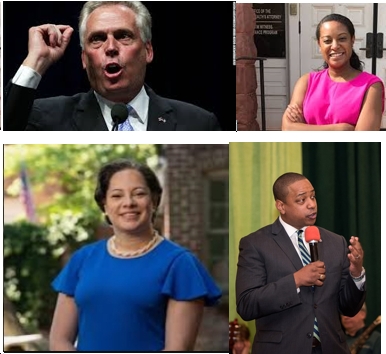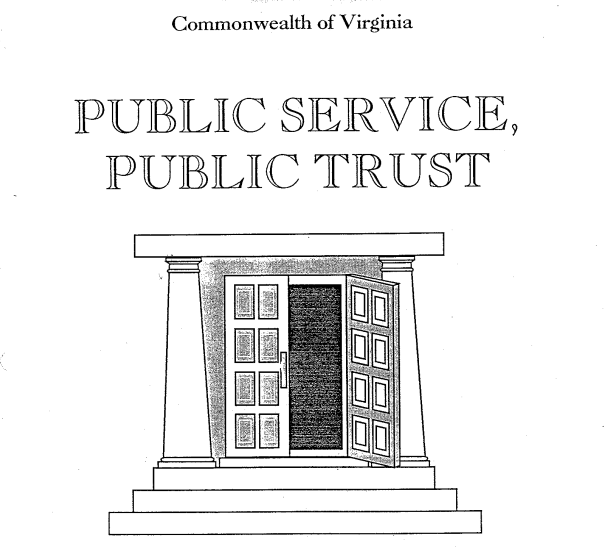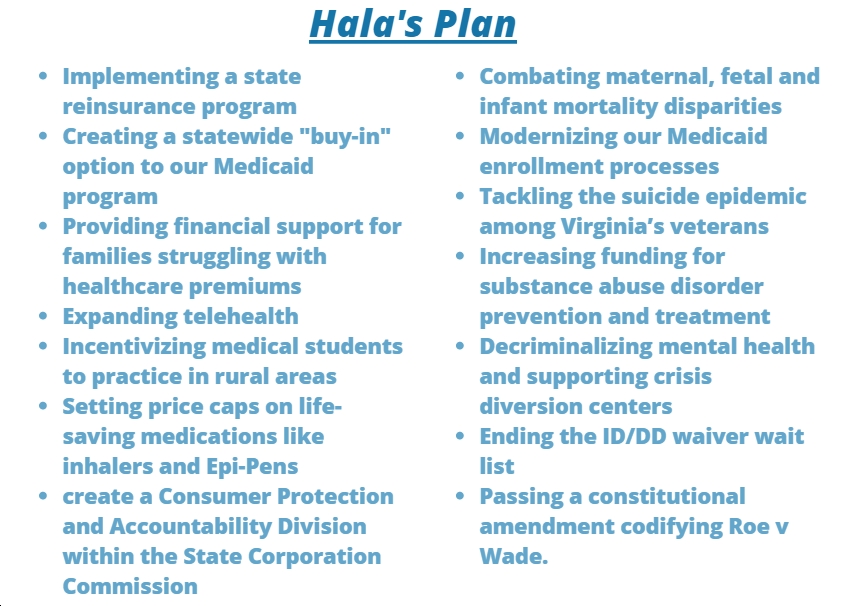Since former Gov. Terry McAuliffe announced on April 17 that he wouldn’t be running for the 2020 Democratic presidential nomination, there have been a lot of rumors floating around that TMac is seriously thinking about running for governor of Virginia in 2021. And yes, McAuliffe can do that, as the one-term limit on Virginia governors only prevents an incumbent governor from running for reelection, not from taking four years off, then running again. So yes, McAuliffe *can* run for governor in 2021, but would that be a good thing for Virginia Democrats? Would McAuliffe be a strong candidate? Is he what we need in this state right now? Here are my arguments for why the answer to all those questions is “no.”
First off, let’s look back at McAuliffe’s political history. In 2009, he ran for the Democratic nomination for governor, spent a ton of money (far more than his two opponents), yet ended up getting crushed (50%-26%) by Creigh Deeds. Then in 2013, McAuliffe managed to “clear the field” of any primary opponents (e.g., Tom Perriello, who was considering it), went on to outspend far-right-extremist Republican Ken Cuccinelli by $17 million (!), yet only managed to edge out “Cooch” by a narrow, 47.7%-45.2% margin. I’d also note that McAuliffe had no “coat tails,” as Democrats picked up a net of ZERO House of Delegates seats that cycle (ending up holding just 32 out of 100 seats).
So let’s just say, Terry McAuliffe was certainly no political juggernaut in 2009 or 2013. Far from it. In fact, I’ve heard many people say that about the only Republican McAuliffe could have beaten was someone as crazy and extreme as “the Cooch.” And again, even with Cooch heading up what was called the “Extreme Team” ticket – Cooch/EW Jackson/Mark Obenshain – and following a very unpopular government shutdown, McAuliffe just squeaked into the Governor’s Mansion. And yes, that was with a Democratic president in the White House, which has tended to hurt Virginia Democrats in gubernatorial elections. But keep in mind, that could very well be the case in 2021 as well (it had better be, or the Virginia governor’s race will be the least of our concerns). So is there any reason to think that McAuliffe would be a political juggernaut in 2021, when he wasn’t in 2009 or 2013 (or 2015, for that matter, when Democrats failed to take back the State Senate and were still stuck at a pathetic 34 House of Delegates seats)? I can’t think of any.
Then we get to McAuliffe’s record as governor, which…was mixed, let’s just say. Actually, if you care about energy and the environment – as well as Dominion Energy controlling our state government – then McAuliffe’s record was abysmally bad, with the Chesapeake Climate Action Network and other enviro groups giving him a D+ grade when it comes to “Carbon Pollution and Clean Power in Virginia.” A few key points in that report included:
- “Overall, the Governor’s two-year record on these vital energy issues is poor – in several cases bordering on outright failure – especially in light of the growing urgency of the climate crisis.”
- ” The biggest and most harmful energy decision the Governor has made to date is his unwavering support for major new pipelines that would traverse western and central Virginia, bringing an unprecedented surge of gas from West Virginia, Ohio and Pennsylvania into Virginia and North Carolina. The Governor also joined the American Petroleum Institute and other fossil fuel advocates in pushing for the potential development of ocean-based drilling rigs as close as 50 miles from Virginia Beach.”
- “[A]fter running for office as a candidate who would work to reduce the threat of global warming, the Governor is instead
supporting the biggest plan in a generation to increase Virginia’s role in expanding climate pollution.” - “Stood with Dominion CEO Thomas Farrell to endorse the Atlantic Coast Pipeline when the company announced the $5.1 billion, roughly 600-mile project in September 2014; has since endorsed and defended the $3.2 billion, 301-mile Mountain Valley Pipeline project as well…Repeats gas industry talking points that gas is “cleaner” than coal, despite numerous scientific studies showing it is nearly as bad as or worse than coal for the climate when accounting for lifecycle emissions.“
I’d also point out that McAuliffe relentlessly repeated Dominion Energy’s fallacious propaganda, and did absolutely nothing to rein in that company’s “capture” of our government. And he refused to meet with folks who were on the front lines of these pipeline boondoggles, whether in Union Hill or the Shenandoah Valley or wherever else. Massive failure on those fronts.
How about on other fronts? See here for my assessment back in late December 2017, as McAuliffe prepared to leave office. The main areas where I criticized him were on:
- Ethics reform, Reining in Corporate Power: I gave him a “D” overall on this front.
- Guns: I gave him a “C,” with some good moves (e.g., vetoes of bad bills) offset by his deal with the NRA on “concealed-carry reciprocity,” about which Virginia Tech mom and gun violence prevention advocate Lori Haas concluded, “[the ]glee the radical NRA and Virginia Citizens Defense League have expressed about this deal, as opposed to the anger and disappointment of gun violence prevention advocates, is a dead giveaway that McAuliffe did not get the best public safety package he could have.”
- Medicaid expansion: I gave him an “A” for effort, but a “D” for actual results, as it simply didn’t get done during McAuliffe’s time in office. Yes, that was mostly Republicans’ fault, but it also was one of McAuliffe’s top priorities, and it didn’t happen.
- Political: I definitely was not impressed with McAuliffe’s political chops while he was governor, as he failed to win back the State Senate. Now, he did manage to get his hand-picked person (Ralph Northam) the Democratic gubernatorial nomination and the governorship, so that shows some political chops, but…well, we see how that’s worked out.
On the plus side, I praised McAuliffe for his strong defense of reproductive choice and LGBTQ equality (note: in fairness, any Democratic governor would have done the same), as well as his work on attracting jobs to Virginia. The problem on the latter point is that the flip side of why Virginia is so “business friendly” is that it’s horrendously bad (ranks #51 in the country) when it comes to workers. And I didn’t see McAuliffe try to do much of anything about that situation.
So, bottom line, I’m not impressed with McAuliffe’s political or policy chops, with a few exceptions.
Still, you might be thinking, McAuliffe’s the strongest candidate Democrats have to hold the governorship in 2021. Except…is he really? I’m highly skeptical. For starters, besides what I’ve already discussed about McAuliffe not exactly being a political juggernaut in 2009 or 2013 (or 2015…or 2019, for that matter), is there any reason to think that Sen. Jennifer McClellan, who just launched her own leadership PAC and is widely rumored as a potential candidate for statewide office in 2021, wouldn’t be as strong or stronger than McAuliffe? How about folks like Del. Jennifer Carroll Foy? Rep. Abigail Spanberger? Attorney General Mark Herring? Rep. Jennifer Wexton? House Democratic Leader Eileen Filler-Corn? other? Is there any reason to think that McAuliffe would be stronger than those folks? I’m not seeing it, particularly.
As for how strong a governor they’d be, is there any reason to think that McAuliffe would be better – more effective? more progressive? more environmental/pro-clean-energy? – than any of the others I’ve mentioned? If so, why?
And finally, is there any particular reason to push aside other qualified candidates, including impressive, highly qualified women and minorities, for McAuliffe? Again, I’m not seeing it.
So bottom line: I’m happy to see McAuliffe working hard to take back the General Assembly this November, but I’m not seeing a strong argument, or really much of an argument at all, for giving McAuliffe dibs on the 2021 Virginia Democratic gubernatorial nomination. To the contrary, I believe we can do much better than TMac Part Deux. Feel free to make your case in the comments section as to why you agree – or disagree. Thanks.


















